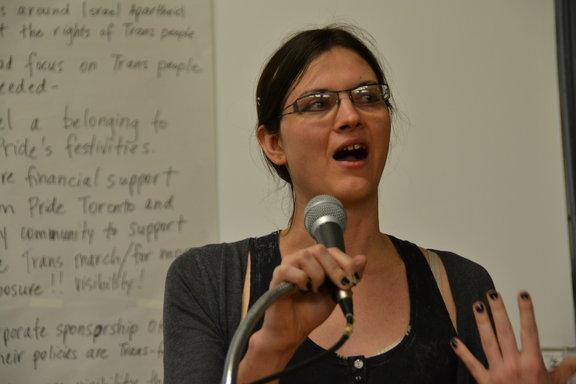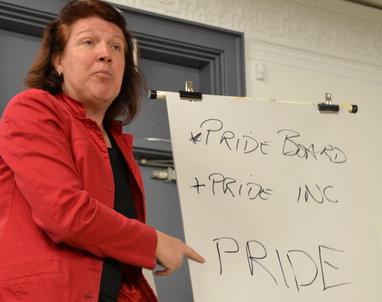
Savannah Garmon delivers the summary presentation for her group Credit: Andrea Houston
The “community marginalized within the margins” brings trans issues to the table, calling on dramatically increased visibility, safety and respect, and produces a manifesto of ideas directed far beyond Pride Toronto (PT).
At the first targeted PT Community Advisory Panel on Dec 9 at the 519 Church Street Community Centre, about 35 members of the trans community and allies don’t just speak to PT. They have messages for police, city officials, participants at Pride, gay and straight people, all levels of government, hospitals, employers, educators, landlords, the courts and the media.
Right off the start, panel member Nichola Ward, the founder of transrights.ca, sets the meeting’s tone, noting that she can’t recall there being a formal “town hall” meeting of Toronto’s trans community ever before, especially one with this much at stake. Loud applause. Some wave their hands palms-up in air, the deaf sign for cheering. It’s a historic moment, she says.
“We get murdered more than anyone else in this community. Suicides are very high. Most live below the poverty line,” she says.
On each table is the November Trans Pulse E-Bulletin, which Xtra published in time for Trans Day of Remembrance, with the latest stats that show 43 percent of trans people in Ontario have attempted suicide.
Panel member and Black CAP board chair Angela Robertson tempers the growing mournfulness in the room. “The trans panel is about listening and celebrating those marginalized within the margins.”
Metropolitan Community Church of Toronto pastor Brent Hawkes leads the room in a moment of silence to recognize absent friends. A few people quietly call out names. “Toby Dancer…”
Hawkes also notes that trans issues have been grabbing headlines recently, pointing to Bill C-389 and attacks on trans people, often sex workers. He tells the room there’s “much work ahead” and the fight for trans rights is yet to be won.
The trans session is unlike any of the previous panels. Stark, constructive, thoughtful and often colourful, discussion is lively at every table. People are angry but also resigned, and less-than-hopeful ideas will be listened to. There is very little debate about Queers Against Israeli Apartheid (QuAIA); there are bigger issues to talk about in the trans community.
And the ideas pour out. Unlike the previous sessions, groups scrawl their points on large sheets of paper with markers. Note-takers race to keep up, summarizing arguments into sentences. At the end, the lists, each in a different handwriting and colour, fill the wall behind the panel like graffiti.
A repeated grievance: the lack of trans representation at PT. “They should be paid positions,” one group demands. Robertson agrees: “That ties in with the stats on poverty in the trans community.”
Ward says PT has never had a trans person on staff.
After the summary presentations, trans activist Susan Gapka gets behind the microphone and says the city of Toronto is ignoring its own anti-racism, access and equity guidelines, which have been a focus in discussions surrounding QuAIA.
“Gender identity is explicitly listed in this policy,” she says, holding the policy high above her head. “So why is it that we’ve been discussing this policy and not discussing trans people, who can not access services through the city of Toronto? Why is that not on the agenda?
“I think it’s really important, especially for the shelter system and other services. There are services in Toronto that can not meet the needs of trans people. How can we think about a parade when we are looking for housing and food?”
Several groups call for PT to name a trans grand marshal for Pride, because the community is more than just male and female.
Trans people need more “safe spaces,” groups say. PT should be advocating for trans issues in the city all year round.
“Washrooms and change rooms are always a problem; some people are just more passable than others,” Stefonknee Wolscht says. “I never pass. Does that still make me transgendered?”
The Trans March, and whether it needs to be taken back, comes up repeatedly. Savannah Garmon’s group questions why the march is so short, only a couple blocks in the Village. Could it be at night? With candles and a loud, rowdy, traffic-stopping group?
Very few people at the trans panel ask Xtra to not publish their pictures or names. There is no “media-free” table. (There has been only one media-free table so far, at the first general panel.)
Roxanne Frances says some trans people have a lot to lose by attending a public meeting. “So it’s good to see all these people step up,” she says.
NDP MPP Cheri DiNovo is at one of the tables. She leaves early, but tells Xtra she’s continuing the fight to have gender identity recognized in the Ontario Human Rights Code. Attorney General Chris Bentley dismissed her latest bid in November.
She also notes that many of the trans community’s larger demands, like employment and landlord protection, requires that legal recognition.
“We can’t begin to fight discrimination until we have those basic protections in human rights,” she says.
Afterward, Ward is beaming, adding she couldn’t feel more proud of her community for stepping up and going on the record.
“I know how brilliant and beautiful and amazing the trans community is; I’ve had privileged access, but not many others know that,” she tells Xtra. “I gotta tell you, it was hard, but I kept it together in there. But that’s real activism, that’s real grassroots.
“The quality of contribution was just extraordinarily good.”
The panel, which appoints to report back to the PT board by late January or early February, operates with zero budget, Ward says. The next targeted panel is Dec 14, aimed at the racialized community.
“Because we receive no money from the powers that be, we’re not beholden to them, which is really important to me,” she says. “That means that we can speak freely.”
As the panel continues to collect hundreds of survey responses, Ward says hate-based responses, like those from homophobic blogs, are being deleted.
Also, Hawkes promises to post a list of the targeted consultations on the CAP’s website and admits the process has been overwhelming for the panel: “The beast has been bigger than we thought.”
The panel came about as part of PT’s June resolution to rescind its censorous ban on the phrase “Israeli apartheid” in the Pride parade. Made up of “LGBTTIQQ2SA leaders and friends,” PT says, the panel is to consult with the community and make recommendations “regarding Pride Toronto’s ongoing working relationship with the broader LGBTTIQQ2SA communities.”
The panel’s mandate is to develop recommendations to ensure Pride promotes freedom of speech, inclusiveness and individual expression.

 Why you can trust Xtra
Why you can trust Xtra


